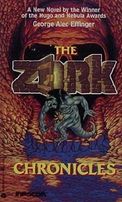The first computer I ever used was a VAX 11/780. The first computer games I ever played came off of the DECUS tapes. EMPIRE, STARTREK ("may the great bird of the galaxy roost upon your home planet"), and my introduction to text adventure games, ADVENT (better known as Colossal Caves Adventure). One of the first games I played after ADVENT was a text adventure game called DUNGEON. I spent hours playing it, experimenting with it, being frustrated by it, enjoying the improved parser (so much better than ADVENT), and poring over a copy of the map (yes, that's exactly the version that I still have somewhere). Dungeon was originally written for the PDP-10 and named that by the authors originally, but it's known to the rest of the universe in its three-part later evolution for microcomputers, released commercially as Zork.
I really wanted to love this book. It's a commercial tie-in novel, always a bit suspect, but it's an Infocom commercial tie-in novel and the Infocom folks knew how to tell stories. It's written by George Alec Effinger, a respected SF author who I've read before. And it's Zork. The Great Underground Empire. A treasure-trove of off-the-wall ideas and hacker humor that may not be of general appeal but which was deeply imprinted in my young psyche.
You are in an open field west of a big white house with a boarded front door.
Even a mediocre wander through the Great Underground Empire would be worth the read.
The Zork Chronicles does offer that. To a degree. It is, of course, based on the later, more popular Zork trilogy rather than the original game, but there are enough similarities that I was following the action through my memory of the famous map. And a few of the most famous landmarks make a more or less satisfying appearance, including the white house and the bank depository (complete with the infamous vault puzzle). If only the reader weren't subjected to the characters along the way.
Effinger makes much in the introduction about taking as inspiration for this story Joseph Campbell's theories of heroes. This isn't a bad idea on the surface. The text adventure genre, one of the earliest types of computer games, put the player directly in the starring role of a story that even had descriptions, characters, and something of a plot. The start of the framing story, featuring the guardian spirit Glorian and a conference for guardian spirits at which he may or may not receive an award, was a bit corny but had some appeal. Bits of Zork lore made a promising appearance (although the Powers That Be should be the Implementers). Spaces were left intentionally blank.
However, then we get the hero who Glorian is expected to guide, Mirakles, a thoroughly uninteresting muscle-bound adventurer type. He and Glorian start bickering in childish and repetitive ways that I was sick of after a couple of pages, but which continued essentially unchanged for most of the book. He constantly swears by Thrag until I wanted to reach into the pages and strangle him. By the time the heroic party ends up under the trap door without a light and grues turn out to be conventional monsters with which one can have heroic combat (sigh), I had a bad feeling.
I love the setting, but unfortunately all the setting offered was some distraction from how annoying every character in the novel is (not to mention the dire dialogue). The plot, such as it is, is a pile of cliches with only a few halfway-original twists, which would be forgivable if it made use of the Zork setting. Unfortunately, it mostly doesn't. The heroes spend a depressing amount of time wandering about in the vicinity of the round room, and while the volcano, the coal mine, and (thank heavens) the bank depository put in appearances, my other favorite portions of the Zork landscape are missing. How can you have a Zork novel without even a mention of Flood Control Dam #3?
Instead, Effinger spends an inordinate amount of time on the hierarchies of guardian spirits, the "Autoexec" (not a concept from Dungeon, if it's even a Zork concept at all), the Control Character (likewise, and a bad attempt at humor compared to Zork's style), and the ins and outs of a heroic journey. He mostly ignores the wonderful background in which he gets to play. There is no exploration of the past of the Great Underground Empire except for a few cursory mentions, no SFnal diving into the workings of the various traps and machinery that fills Zork, and certainly no sense of epic sweep of history. It's sad when a game with a limited vocabulary and a few lines of text per room do a better job of projecting an epic history than a novel written by an accomplished SF author. And what sly humor is present rests entirely on repeating jokes from Zork, which is okay as far as it goes but doesn't add anything to the mythos.
I would have been content, even happy, with a simple tour of the Zork world. I would have been thrilled by an exploration of its history and inner workings at the far greater length afforded by a novel. Unfortunately, despite occasionally successful attempts to use a few of Zork's best jokes, Effinger's contribution here is arguably negative: I think this novel is less enjoyable than a simple transcript of someone playing Zork would be. Sadly, even if you love Zork, I recommend avoiding this book.
Reviewed: 2007-10-12
